Kategorie: ‘Medizintechnik’
Top placements in international ranking
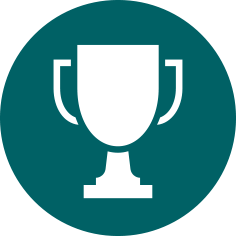
The portal Research.com informs in the newly published ranking that the Electrical Engineering and Information Technology of the RWTH achieved the 2nd place in the Germany-wide comparison. Internationally, RWTH ranks 65th in this discipline.
Research.com evaluates the frequency of citations of scientific articles and other publications for the ranking. Data from the OpenAlex and CrossRef databases are used for the evaluation. Researchers are ranked using the D-index, a variation of the H-index, which measures citations to their scientific papers within a discipline. All those who achieve a D-index of at least 30 are included in the rankings. The sum of the D-indexes of all listed scientists of a university is then decisive for its placement in the university ranking.
Accordingly, the following RWTH Electrical Engineering and Information Technology professors have qualified for the ranking:
- Dirk Uwe Sauer from the Chair of Electrochemical Energy Conversion and Storage Systems Engineering.
- Rik W. De Doncker from the Chair of Power Electronics and Electrical Drives
- Heinrich Meyr from the Chair for Distributed Signal Processing
- Antonello Monti from the Institute for Automation of Complex Power Systems
- Max Lemme from the Chair of Electronic Components AMICA – Advanced Microelectronic Center Aachen
- Steffen Leonhardt from the Chair of Medical Information Technology
- Petri Mahönen from the Chair and Institute of Networked Systems
- Rainer Leupers from the Chair of Software for Systems on Silicon
Encouraging women to take up MINT professions – support for ZDF heute journal
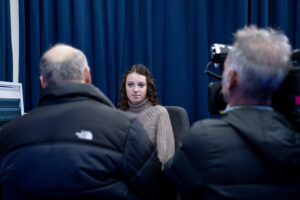
BA student Helena in an interview with the ZDF heute journal team. Photo: C. Antweiler
At the end of January, the team from ZDF heute journal visited the Institute for Communication Systems at RWTH Aachen University for a report. The report provides insights into the topic of “women in MINT subjects”, which are sometimes chosen even less by women and girls, such as mathematics, computer science, natural science and technology. Editor Peter Böhmer from the North Rhine-Westphalia State Studio researched the reasons for the low quota of women at RWTH Aachen University and what approaches could be taken to change this.
Through interviews with various female RWTH students, including our BA student Helena, as well as with Univ. Prof. Dr. rer. nat. Aloys Krieg, Prorector for Teaching, the heute journal team was able to gain an impression. The Institute for Communication Systems and a lecture by Prof. Peter Jax provided the pictorial framework for the report.
You can find the report in the ZDF Mediathek.
RWTH student team AixSense successful in international SensUs competition
The Faculty of Electrical Engineering and Information Technology warmly congratulates students Daniyar Kizatov, Jiayi He, Anshul Prashar and Shunjiro Sodei and all involved on their successful second place in the international Biosensor Competition SensUs! The fourth generation of the RWTH Aachen student team AixSense participated in the SensUs competition at Eindhoven University of Technology this year.
Consisting of four ambitious students from the fields of Computer Engineering and Micro-Nano-Electronics, the interdisciplinary team has spent the past six months developing a prototype biosensor to detect the influenza A virus. Thus, the team worked in the laboratories and clean rooms of our Institute of Materials in Electrical Engineering 1 at RWTH, where the chips (see picture on the right) were produced as key components for the technology. The team was supervised by Prof. Sven Ingebrandt and Dr. Vivek Pachauri.
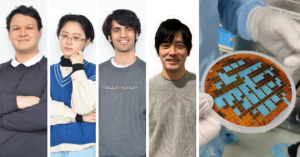
Daniyar Kizatov, Jiayi He, Anshul Prashar, Shunjiro Sodei | Copyright: IWE1
At the final event, the AixSense team presented the biosensor prototype and was awarded in four categories for analytical performance, creativity, transferability of the concept and public inspiration. In the Analytical Performance category, RWTH Aachen University took second place by a slight margin.
“Our team was never so close to winning one of the most important awards. It was very close and we are proud of our performance.”
– Daniyar Kizatov, team leader of AixSense
This year, 14 student teams from Denmark, Egypt, the Netherlands, Germany, Portugal, Switzerland, China, Sweden, the USA, Belgium, the UK, Canada and Spain took part in the competition.
The biosensor has been known to the public at the latest since the introduction of the Covid rapid test – but the SensUs community has been supporting young scientists to present their research in the field of biosensors internationally for five years. Every year, a new generation of teams faces the challenge of developing a biosensor prototype for a new disease. So far, the focus has been on detecting biomarkers for kidney failure, heart failure, antibiotic resistance, rheumatism and epilepsy.
Next year, the SensUs competition aims to detect cytokines as crucial proteins in the immune system. The application phase for the next generation of the AixSense team starts in December 2021 – more information on how to apply can be found here.
(Original article press release IWE1)
Awardees of the Brigitte-Gilles-Award 2020
The Brigitte Gilles Award 2020 honors projects and initiatives that improve the conditions for women’s study, teaching, and research at the university. In this way, they contribute to increasing the number of female scientists and students in courses with a low representation of women.
We congratulate all the winners but are especially pleased for the two winners from our faculty. Professor Janina Fels and Ms. Karin Loh from the Chair and Institute of Hearing Technology and Acoustics (IHTA) were awarded for their initiative “The interactive world of acoustics for big and small children”. Here, concepts were developed that enable girls between the ages of three and twelve to explore and learn about hearing and acoustics in a playful and interactive way.
The awards were presented in a total of four categories and are endowed with up to 2500 euros. The awards in the other categories were given to the following researchers and projects: Katharina Müller from the Chair of Production Systems, the project “Hlumani – giving the future a fair chance” from the Chair of Landscape Architecture at RWTH, the University of Stuttgart, and the University of Cape Town and Dr. Anna Stertz from the Chair and Institute of Psychology.
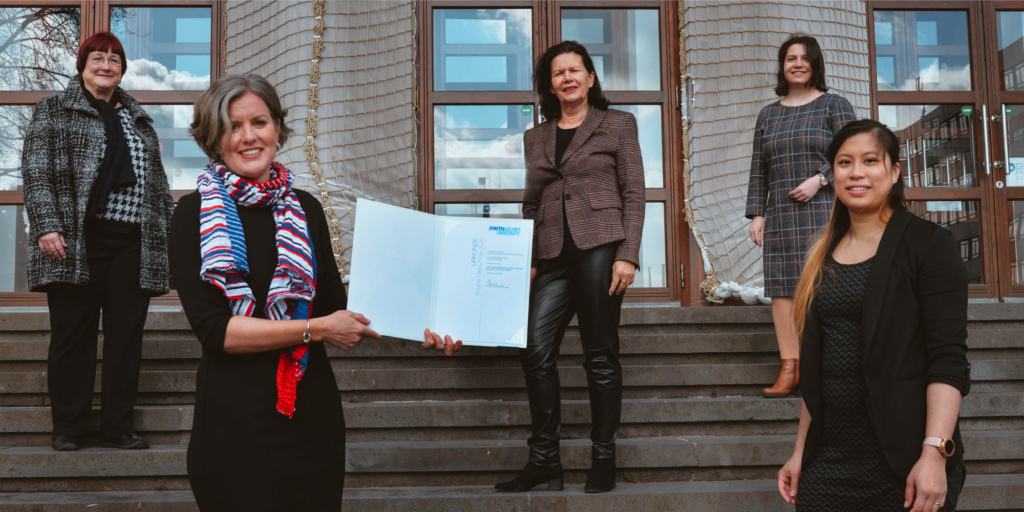
Foto: Andreas Schmitter
Publication – Contactless, Battery-free, and Stretchable Wearable for Continuous Recording of Seismocardiograms
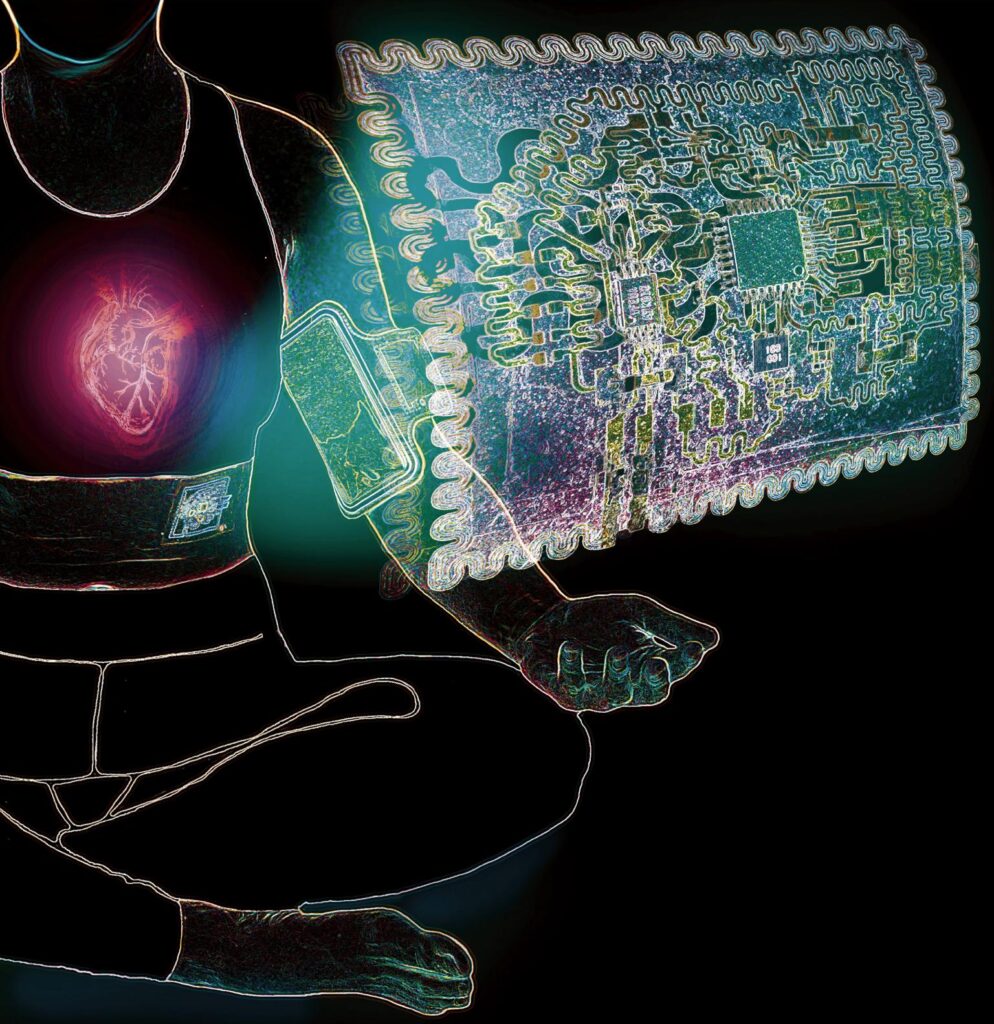
Photo: IWE1
Prof. Dr.rer.nat. Sven Ingebrandt and his research team published the article “Contactless, Battery-free, and Stretchable Wearable for Continuous Recording of Seismocardiograms” in the journal ACS Applied Electronic Materials.. This article presents a study to enable remote measurement of mechanical cardiac activity using a contactless wearable patch and seismocardiography (SCG). Near-field communication (NFC) technology is used for power supply and wireless recording of SCG data. A separate electrocardiogram (ECG) is used as a reference. The results of this study show a good signal-to-noise ratio and a close correlation between SCG and ECG recordings. This method could become another valuable tool for cardiac monitoring in the future.
Contactless, Battery-free, and Stretchable Wearable for Continuous Recording of Seismocardiograms
DFG priority program AUDICTIVE
Within the framework of the priority program AUDICTIVE of the DFG (German Research Foundation) three projects with the participation of Prof. Dr.-Ing. Janina Fels were approved. On the one hand, the coordination project, which focuses on interdisciplinary exchange and research data management, was approved. On the other hand, the project “Listening to, and remembering conversations between two talkers: Cognitive research using embodied conversational agents in audiovisual virtual environments”, which is a joint proposal with Prof. Dr. Torsten W. Kuhlen and Prof. Dr. Sabine J. Schlittmeier, will be funded. Furthermore, the project “Evaluating cognitive performance in classroom scenarios using audiovisual virtual reality – ECoClass-VR”, which is a joint proposal with Prof. Dr.-Ing. Alexander Raake, TU Ilmenau and apl. Prof. Dr. Maria Klatte, TU Kaiserslautern, will be funded.
The priority program “Auditory Cognition in Interactive Virtual Environments – AUDICTIVE” is intended to make it possible, by linking the three disciplines – acoustics, cognitive psychology and virtual reality/computer science – to significantly expand the knowledge about hearing-related cognitive performance in real scenes and thus to realize the development of an “auditory-cognitive-validated” VR technology. By applying interactive VR technology, it should be possible to understand auditory perception in complex audiovisual scenes that are close to real life. Situations such as classrooms, open-plan offices, multi-party communication or outdoor scenarios with multiple (and moving) sound sources should be better understood with the help of the results.
Project InductInfra – Will Roads Be Able to Supply Cars With Energy in the Future?
Within the project “InductInfra – Inductive Dynamic Energy Supply of Vehicles via Road Traffic Infrastructure” the Institute of Electrical Machines under the direction of Professor Kay Hameyer and the Institute of Highway Engineering under the direction of Professor Markus Oeser cooperate in this field. The project is financed by the Federal Ministry of Transport and Digital Infrastructure within the framework of the “Road Innovation Program” with about 1.6 million Euros until October 2023.
Both institutes want to develop concepts and material systems for energy transmission between vehicle and road and to research integration into the infrastructure. The aim is for vehicles to draw the energy required for operation or rapid charging from an induction field while driving. Induction modules embedded in the road generate the energy required for this. The project aims to develop the induction modules, the necessary materials and the technologies for their permanent integration into the transport infrastructure. Furthermore, the potential, operational safety and economic efficiency of supplying the induction modules with renewable energy will be determined.
Currently, the electrification of individual and commercial transport is in focus. There are still many problems for long-distance traffic, such as the lack of range, battery size, battery weight and the incomplete charging infrastructure. One possible solution could be continuous charging or energy transfer between the vehicle and the road during the journey. Electric vehicles with a virtually unlimited range, moderate battery size and low battery weight would thus become possible.
Source: Press and Communications RWTH
Rethinking Intensive Care Medicine
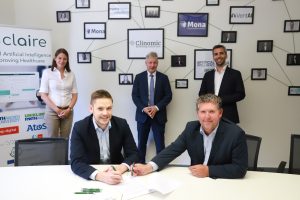 Nowadays, patients receive comprehensive treatment from a number of qualified medical professionals. Through a unique combination of translational medical research, data science and computational intelligence, Clinomic GmbH aims to serve as an interface between medical professionals and databases. The result? Mona, the intelligent assistance system for intensive care units, which is designed to support nurses and doctors in the optimal treatment of their patients.
Nowadays, patients receive comprehensive treatment from a number of qualified medical professionals. Through a unique combination of translational medical research, data science and computational intelligence, Clinomic GmbH aims to serve as an interface between medical professionals and databases. The result? Mona, the intelligent assistance system for intensive care units, which is designed to support nurses and doctors in the optimal treatment of their patients.
Clinomic GmbH was founded in 2019 by an interdisciplinary research team. Among the founding members are Univ.-Prof. Anke Schmeink from the Department of Information Theory and Systematic Design of Communication Systems, Prof. Guido Dartmann from theInstitute for Communication Technologies and Embedded Systems and Dr. med. Arne Peine, Priv.-Doz. Lukas Martin and Univ.-Prof. Gernot Marx from the Universitätsklinik Aachen together with Univ.-Prof. Christoph Thiemermann from the William Harvey Research Institute of Queen Mary University of London.
Since its launch, Clinomic GmbH has not only won the RWTH Spin-off Award 2019, but has also received funding of 1.6 million euros and is a partner of renowned companies such as Microsoft, NVIDIA and Google.
Project “The People’s Ventilator – PV1000” enters the practice test
Since April 2020, employees, colleagues and alumni of the RWTH Aachen around Prof. Dr.-Ing. Dr. med. Steffen Leonhardt have been developing a ventilator that is medically suitable for ventilating COVID-19 patients in intensive care units over several weeks. It is intended to serve as a simple and robust device in situations where conventional ventilators are in short supply.
Now the project has reached an important milestone: the so-called “Graphical User Interface” is being tested by ventilation experts throughout Germany, including numerous medical directors of intensive care units. They are testing whether the result really does enable safe operation in intensive care units. The feedback is incorporated into the software as quickly as possible so that the next step – the integration of all individual elements of the PV1000 in a first prototype – can be completed soon.
Ventilators are complex technical systems that support different ventilation modes and must react correctly to many situations. An essential success factor is easy and comprehensible operation by medical personnel. In addition to the Chair for medical information technology (MedIT) , the Chair for medical technology (mediTEC) , another partner from the RWTH, was able to contribute its expertise in the safe and usable development of medical devices. For the PV1000, the operating concept developed by the Chair for computer science 11 – Embedded Software (i11) has now been implemented and the programming completed.
Ventilator for intensive care in crisis areas
Ventilator for intensive care in emergency areas: humanitarian project of members and partners of the RWTH Aachen
The corona pandemic poses enormous challenges for medical care even in highly developed countries. Catastrophic conditions are looming in developing countries. Against this background, employees, colleagues, and alumni of the RWTH Aachen University around Prof. Dr.-Ing. Dr. med. Steffen Leonhardt have come together to develop a ventilator that is medically suitable for ventilating COVID-19 patients in intensive care units over several weeks. Thus, this initiative complements the numerous other projects and devices aimed at short-term emergency care, e.g. on the way to the hospital. The PV1000 device is being developed in cooperation with intensive care physicians at the Aachen University Hospital, taking into account aspects relevant to approval. To finance and manufacture the devices, which are to be made available free of charge to hospitals in emergency areas, the non-profit association AC4Health was founded, which will accept donations, components, and cooperation offers with immediate effect.
The disease COVID-19 leads to various supply shortages around the globe, which motivates more and more people to alleviate the need through voluntary work. Thus, five weeks ago, around the experienced developers of respiratory equipment, Professor Steffen Leonhardt and Dr. Marian Walter, not only numerous employees of their own chair for medical information technology (MedIT), but also of the chair for computer science 11, the chair for medical technology (mediTEC), the institute for motor vehicles (ika) and the business fka GmbH gathered. They all share the goal of making a life-saving contribution to mastering this global medical challenge by developing and manufacturing a ventilator for intensive care medicine.
The Institute of Plastics Processing (IKV) is also involved in the production of complex components, and the Institute for Fluid Power Systems and Controls (IfAS) provides advice. Furthermore, the Clinic for Operative Intensive Medicine and Intermediate Care (OIM) is involved with regard to medical usability and testing. Operationally, the companies Mindmotiv GmbH supports Mindmotiv in testing and SurgiTAIX AG in quality management to ensure the highest possible degree of maturity of the ventilator.
The intensive voluntary work, also on weekends, has paid off: at least one technical solution variant has been developed and tested for all relevant components of the PV1000 ventilator, so that the overall concept is now being defined, taking into account the availability of critical components. The project has now entered the operational phase, as the specification has been finalized, components procured and the actual device can be designed and built. For this purpose, the company AC4health gUG was founded last Thursday, which fulfills the strict criteria of a non-profit organization to enable the realization of the device on the basis of donations and grants. In the first step, 1,000 devices are to be built and shipped to affected regions with political or private support.
Further information on this humanitarian project can be found on the product website of the PV1000



